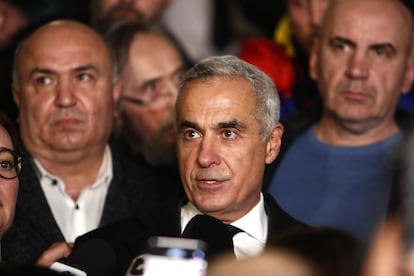Musk and Putin’s dual interference in Europe
The Tesla boss’s support of the far-right AfD in Germany and the insults to the British government, are compounding nervousness on the continent

Interference in western politics is no longer just coming from Russia. There is another figure bent on meddling in the European democratic process. And his interference is causing nervousness in a number of capitals in the run up to the general elections in Germany, the EU’s most powerful economy and populated country.
There is the threat from Moscow and Vladimir Putin’s so-called hybrid war and attempts to destabilize electoral campaigns, the most recent case of interference being the presidential elections in Romania last November, which were suspended by the Constitutional Court due to an alleged disinformation and manipulation campaign in favor of the extreme right-wing and pro-Russian candidate Calin Georgescu.
Then there is the interference practiced by Elon Musk, the richest man in the world, master of Tesla, SpaceX and the social network X, and member of Donald Trump’s new administration, which will take office on January 20. His interference is neither illegal nor clandestine; it is simply brazen.
In the United Kingdom, Musk’s attacks on Prime Minister Keir Starmer have become one of the most pressing issues facing the Labour government. The billionaire singles out Starmer in X with apocalyptic accusations and a clear inflammatory intent. In Germany, Chancellor Olaf Scholz who has also been the brunt of Musk’s X attacks, has called for calm in the face of “the erratic statements of a U.S. billionaire.”
“Only the AfD can save Germany,” Musk wrote on X on December 19, referring to the acronym of the far-right Alternative for Germany party. The tycoon went on to elaborate in an article in the conservative daily Welt am Sonntag: “Germany is at a critical juncture. Its future teeters on the brink of economic and cultural collapse.” A few days earlier, when the Romanian Constitutional Court announced the controversial annulment of the presidential elections after the victory of the pro-Russian Georgescu in the first round, Musk said: “How can a judge cancel an election and not be considered a dictator.”
Musk’s meddling comes in a year in which Europe faces several elections: besides the German legislative elections and the repeat of the Romanian presidential elections, Poland and other countries will go to the polls. Meanwhile, Ukraine has reached a critical moment in its war and far-right parties are feeling the wind at their backs; according to polls, AfD will jump to second place in the February 23 elections.
“External influence is a danger to democracy, whether it is covert, as was evidently the case recently in the Romanian elections, or open and blatant, as is currently being practiced particularly intensively on (social media) platform X,” German President Frank-Walter Steinmeier warned. “Anti-democratic tyrant,” Musk shot back.

In Germany, Musk has offered the far right and its candidate for chancellor, Alice Weidel, a double stamp of respectability. Viewed with great suspicion by many in her own country, she is the choice of the richest man in the world and a friend to the next U.S. president. Musk’s op-ed supporting the AfD was published in the columns of none other than the daily Die Welt and its Sunday newspaper Welt am Sonntag, a newspaper belonging to the powerful Axel Springer media group. In just a few days, this party — with its echoes of 1930s German nationalism, deemed too radical even by France’s Marine Le Pen — made significant strides toward normalization.
“Alice Weidel can’t believe her luck with this election recommendation,” says Thorsten Benner, director of the Global Public Policy Institute in Berlin. “I would say there are many people who wouldn’t have thought about voting for them who are now going to vote for them because Musk recommended it, but Axel Springer publishing this article is an important step for AfD.”
In the U.K., Musk is using a 10-year-old grooming scandal to attack Starmer, who was then in charge of public prosecutions. More than 1,400 girls in the care of welfare services were sexually abused by organized groups made up mostly of men of Pakistani origin, according to an independent report commissioned by the government. “Starmer must go and he must face charges for his complicity in the worst mass crime in the history of Britain,” Musk wrote on X.
In Romania, which is a member of NATO, the interference has stirred a political and constitutional crisis. Its intelligence services suspect “Russian hybrid actions” on Internet infrastructure, similar to those in neighboring Moldova and Ukraine, and the “abusive exploitation” of the algorithm of TikTok, the platform with more than 2 billion users that was instrumental in boosting the extremist candidate.
The Romanian case
“Romania is a very interesting example of how our democracy can be vulnerable,” observes veteran Romanian analyst Radu Magdin. According to Magdin, it serves as a lesson on the need for better and more transparent laws on the financing of partisan campaigns on networks and paid collaborations with influencers who accumulate millions of followers.
Sorin Ionita of the Romanian think tank Expert Forum believes that the parallel between the interference in Romania and Germany is misguided. “Musk is an identifiable person with a known agenda. He is like a crazy cowboy, but we see what he does. In Romania, it’s totally different.” In his country, he says, the external campaign has taken advantage of internal weaknesses, and has benefited from the existence of “opaque and incompetent” politicians and institutions.

Marietje Schaake, author of the book The Tech Coup: How to Save Democracy from Silicon Valley, explains, “When Musk openly tweets his opinions, or makes a donation, it is different from the non-transparent role that X algorithms play in mobilizing voters. It is disturbing to see him using his voice, his wealth, and his social media platform to support leaders of the nationalist far right. Musk occupies too many roles without the necessary checks and balances.”
Schaake, a former liberal MEP from the Netherlands and now a researcher at Stanford University, says that “in the case of Russia, the methods are of a more silent nature — misinforming and sowing divisions in a non-transparent way.” And yet, there are similarities: “Russian actors exploit the business models of American tech companies to find and reach their audiences,” she says.
Other countries have detected interference campaigns, mainly from Russia. The potential of social networks to destabilize, manipulate and skew elections is becoming increasingly clear. But Romania has been the first country to pull the emergency brake on the elections just before the second round. This has proved a radical and highly controversial action that sets a “dangerous precedent,” according to a high-ranking European official. Political scientist Camil Ungureanu, professor at Pompeu Fabra University, believes that “the court’s intervention could exacerbate the situation. It seems plausible that the [court] decision is also motivated by the establishment’s fear of losing its privileged position.”
Romania’s actions fuel the Kremlin’s narrative that liberal democracies can’t accept the results of their elections. “I am sure that all these games are perfectly understandable to any more or less objective observer,” Russian Foreign Minister Sergey Lavrov said. Romania is the first case of elections annulled due to interference on social networks. And it puts other countries on alert regarding Russia’s hybrid warfare; Moscow actually has an agency with units specially dedicated to electoral interference and has a powerful machinery to spread and amplify false news and disinformation campaigns that are often based on real problems and cases, according to several investigations.
Debate in Germany
“What happened in Romania could happen anywhere in Europe,” warns MEP Siegfried Muresan of the European People’s Party. “[Russia’s] aim is to favor extremist anti-European candidates, in order to destabilize EU member states and disrupt the EU as a whole. They have done this on a smaller scale in the past. What we are seeing now is a whole new level.”
Benner of the Global Public Policy Institute believes that, in Germany, the reaction should not be limited to anger at Musk but should take concrete forms. For example, more regulation of X. Or a campaign not to buy Tesla cars. “It is also necessary to find good arguments on issues that mobilize voters.” Issues such as social unrest and the economic crisis that, precisely, feed the extreme right. Musk acts as a distraction. “Criticizing Elon Musk does not solve a single problem experienced by German voters,” he points out.
The German debate is not only political. It is journalistic. In the editorial offices of Die Welt and Welt am Sonntag, discussions have been intense and the head of Opinion, Eva Marie Kogel, has resigned. Alongside Musk’s article, the newspaper published an article by its editor-in-chief, Jan Philipp Burgard, taking the opposite view. Axel Springer is not just any media group. Since the post-war period, its articles have included support for Israel. Hence, readers might well have been surprised to read a plea to vote for a party that the newspaper itself describes as “partly antisemitic.”
“I cannot recall a comparable case of interference in the electoral campaign of a friendly country in the history of Western democracies,” declared Friedrich Merz, Christian Democrat candidate and favorite to succeed Scholz as Chancellor. In the U.K., on the other hand, Musk’s attacks on Starmer have been applauded by the British opposition. The new Conservative leader, Kemi Badenoch, has backed Musk’s attacks by calling for an inquiry into past abuses, despite the fact that her party previously refused to push for them.
Populist leader Nigel Farage has also praised the billionaire, encouraged by the promise of massive funding for his party, Reform UK. However, the bromance between the pair has soured since Musk wrote on X that Farage is not up to the task of leading Reform UK. The fallout came after Musk launched a campaign for the release of the far-right activist Tommy Robinson, former leader of the English Defense League, in prison contempt of court by repeating false claims against a 15-year-old Syrian refugee. Musk falsely portrays Robinson as a champion of free speech, claiming he bravely exposed alleged power maneuvers to cover up sex scandals, supposedly to favor a Muslim minority. Farage failed to fall into line.
Marietje Schaake, the author of The Technological Coup, believes that the recipe for interference is more transparency and accountability. “Generally speaking, the distribution of information and the financing of campaigns and candidates is acceptable as long as it is within the limits of the law,” she says. “I think it’s time to critically review current laws to avoid inappropriate interference.”
According to Ionita of the Romanian Expert Forum, what happened in his country is a warning sign for Europe. “If someone was interested in amplifying internal disputes and the incompetence of the authorities in Romania, in Germany the stakes are 10 times higher,” he says. “If Germany is destroyed politically, that is how Europe will be ruined.”
Sign up for our weekly newsletter to get more English-language news coverage from EL PAÍS USA Edition
Tu suscripción se está usando en otro dispositivo
¿Quieres añadir otro usuario a tu suscripción?
Si continúas leyendo en este dispositivo, no se podrá leer en el otro.
FlechaTu suscripción se está usando en otro dispositivo y solo puedes acceder a EL PAÍS desde un dispositivo a la vez.
Si quieres compartir tu cuenta, cambia tu suscripción a la modalidad Premium, así podrás añadir otro usuario. Cada uno accederá con su propia cuenta de email, lo que os permitirá personalizar vuestra experiencia en EL PAÍS.
¿Tienes una suscripción de empresa? Accede aquí para contratar más cuentas.
En el caso de no saber quién está usando tu cuenta, te recomendamos cambiar tu contraseña aquí.
Si decides continuar compartiendo tu cuenta, este mensaje se mostrará en tu dispositivo y en el de la otra persona que está usando tu cuenta de forma indefinida, afectando a tu experiencia de lectura. Puedes consultar aquí los términos y condiciones de la suscripción digital.








































